Learn cooperative societies: principles, advantages, and limitations. Explore how they serve the common man, promote self-help, and foster economic equality.
Philosophy of Cooperative Society
The philosophy of cooperative society is to serve the common man and to liberate him from the oppression of the economically strong people and organizations.
Mutual assistance and service are the objectives as distinguished from the aim of the other forms of organization, which is primarily making of profit.
It aims at encouraging self-help on the part of economically weaker sections of the society by looking after a truly cooperative society is the elimination of profit and provision of goods and services to members at cost.
As a form of organization, it is an enterprise ordinarily set up by “economically weak” individuals to further their common economic and social interests to eradicate capitalist exploitation, to eliminate middlemen, and to bring the consumer and producer together.
The cooperative movement is commenced among the poor deprived labors and low-middle class people of the society in the post-industrial revolution.
It first begins in 1844 in Britain by 28 weavers. Later this organization revealed at different nations at different times.
Definition of Cooperative Society

A cooperative society is a voluntary association that started with the aim of the service of its members. It is a form of business where individuals belonging to the same class join their hands for the promotion of their common goals.
These are generally formed by poor people or weaker sections of people in society. It reflects the desire of the poor people to stand on their legs or own merit.
His philosophy of the formation of a cooperative society is “all for each and each for all”. Cooperation work with the feeling of helping others.
A cooperative society is a special type of society, which is established by an economically weak person for the betterment and upliftment of their economic condition through mutual help.
Many business organizations have the main motive to earn profit and also exploit customers.
But this organization is based on help each other through available resources and also provide goods to society members without profit or at a lower price.
Simply speaking, we know that cooperative means to work together to improve their economic condition. This organization is based on “all for each and each for all”.
So this organization will function under the mutual cooperative of all the members. In this organization, all members will be equal and free for their rights. Therefore “one man one vote” system will prevail in this society.
Many business enterprises established to earn a profit, but cooperative society has a motive of service to the members of the society for common welfare not to earn a profit.
The first cooperative society was initiated by Robert Owen in 1844 A.D. named “Rochdale Society of Equitable Pioneers”.
The main objective of this society was to save poor people providing goods at a lower price from the market price and eliminate the middle mad and supply better services to its members.
So, we can say that a cooperative society is an association of a person who joins the organization willingly to protect economic & social interest.
In a cooperative society, people can enter it as their wish, and also, they are free to leave a cooperative society, but they cannot transfer their share.
Cooperative is a society which has its objective the promotion of the economic interest of its members following cooperative principles.
According to Calvert, a cooperative denotes a form of organization wherein persons voluntarily associate together as human beings based on equality for the promotion of economic interests of themselves.
Cooperative is only one aspect of a vast movement that promotes the voluntary association of individuals having common needs who combine towards the achievement of common economic ends.
Characteristics of Cooperative Society
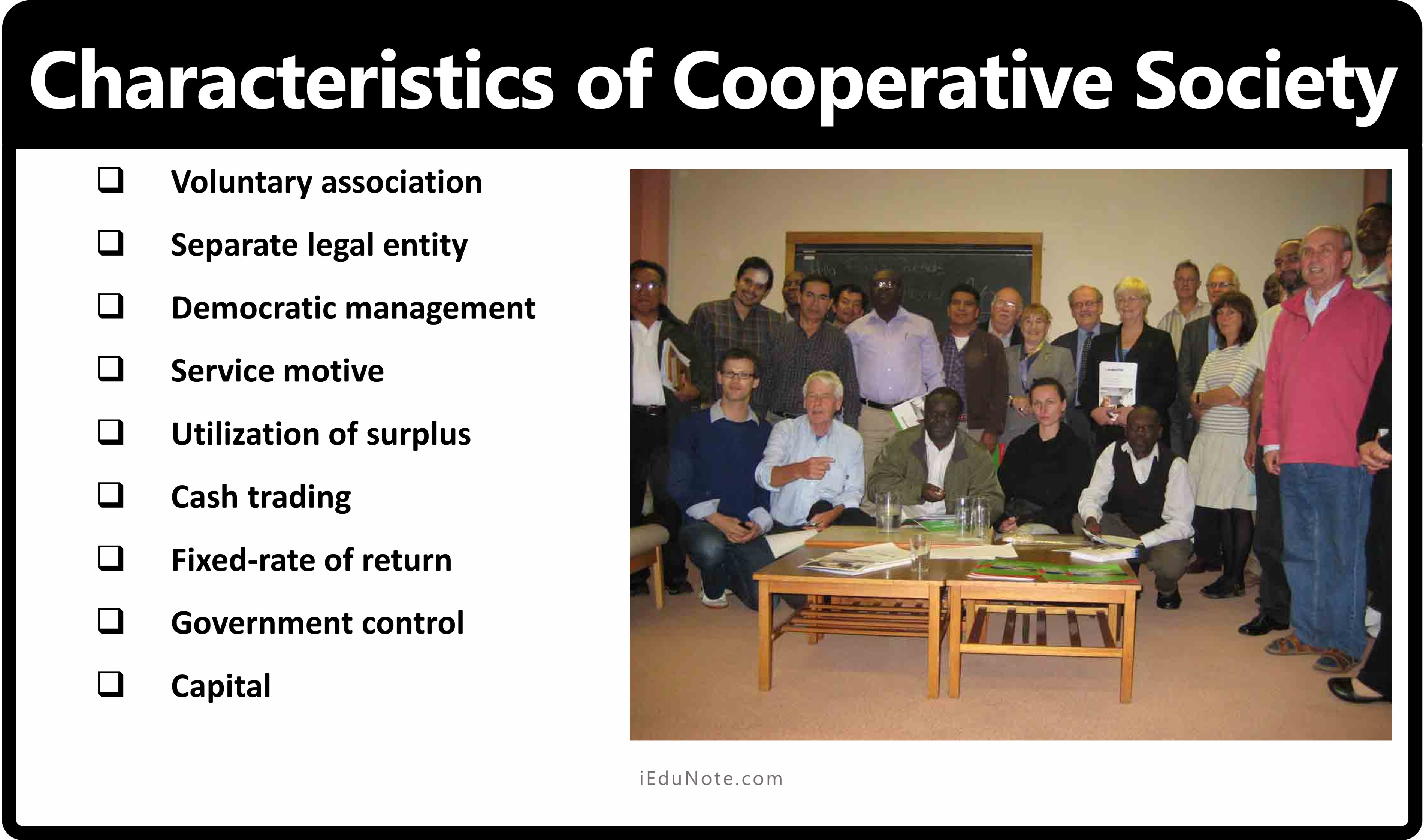
Based on the above definitions, we can derive the following characteristics of cooperative organizations.
Voluntary association
Everybody having a common interest is free to join a cooperative society. There is no restriction based on caste, creed, religion, color, etc. Anybody can also leave it at any time after giving due notice to the society.
That is the specialty of any cooperative society. There should be a minimum of 10 members for a cooperative society, but there is no maximum limit for the membership.
Separate legal entity
A cooperative society after registration is recognized as a separate legal entity by law. It acquires an identity quite distinct and independent of its members can purchase, dispose of its assets, can sue, and also can be sued.
Democratic management
Equalities are the essence of cooperative enterprises, governed by democratic principles. Every member has got equal rights over the function management of that society.
As such, each member has only single voting right irrespective of the number of shares held or capital contributed by them.
In the case of a cooperative society, no member detects the terms and conditions of the functioning because “one man one vote” is the thumb rule.
Service motive
The main objective being the formation of any cooperative society is for mutual benefit through self-help and collective effort. Profit is not at all on the agenda of the cooperative society.
But if members so like, they can take up any activities of their choice to generate a surplus to meet the day-to-day expenses.
Utilization of surplus
The surplus arising from the operation of a business is partly kept in a separate reserve and partly distributed as dividend among the members.
Cash trading
One exception in the cooperative society is that like other businesses, if never go for credit sales. It sells goods based on cash only.
Hence, the cooperative society hardly comes across financial hardship because of the noncollection of sales dues. Members can only purchase based on credit, which is an exception to the present rule.
Fixed-rate of return
All members are supposed to contribute capital for the formation of a cooperative society or at the time of joining as a member of the cooperative society.
Government control
The government regulates all the cooperative societies of the country through its different rules and regulations framed from time to time.
Cooperative societies of the country are required to register, and sometimes different State Governments also frame laws regarding the registration and functioning of cooperative societies for their states.
Capital
The capital of the society is raised from its members by way of share capital.
However, the major part of finance is raised by the society by taking a loan from the government or by accepting grants and assistance from the Central or State Government or from the apex cooperative institutions like state and cooperative central banks operating in that state.
Principles of Cooperative Society
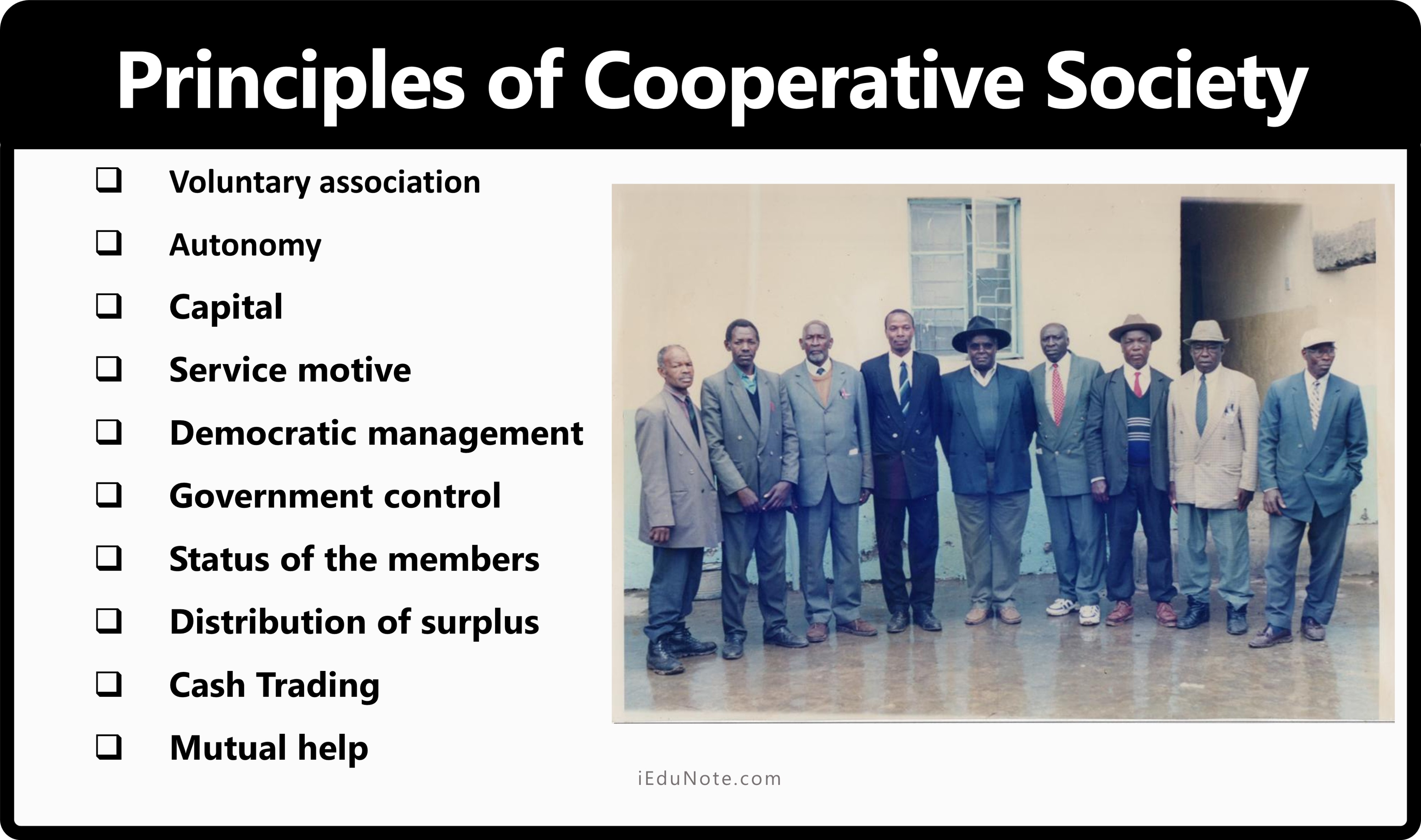
The followings are some of the principles on which a cooperative society stands:
Voluntary association
The membership of a cooperative society is voluntary and open to all adult persons having common interests. Any person can become a member of the organization irrespective of caste, creed, color, sex, and religion.
Autonomy
A cooperative society is a self-governing institution. It enjoys the status of autonomy because it is self- sufficient, self-renewing, and self-controlling organization. It has a continuous existence because it is not affected by the death of any member of society.
Capital
The capital of a cooperative society is raised from its members in the form of share capital. As the share capital is not sufficient to meet its operational cost, it borrows loan from the government or apex cooperative organization.
Service motive
It is organized to render service to its members and not to make a profit.
Democratic management
The management of a cooperative society is done on the democratic line. The management is vested in the bands of a managing committee elected by the members.
The general body of the members determines rules and regulations for the management, the managing committee functions within the framework of the principles framed by the general body.
Government control
The cooperative organizations are subject to the rules and regulations of the government because it is registered.
Status of the members
In a cooperative society, each member is given one vote irrespective of the number of shares held by him. In this organization, nobody can control society based on his share capital.
Distribution of surplus
The income of the cooperative societies is distributed among the members based on their capital contribution.
Cash Trading
The trading operation of the cooperative society is done based on cash. It never allows the principles of credit in its trade practice.
Mutual help
It always aims at developing the spirit of cooperation among the members. Every member of the society is required to act for the maximum benefit to other members. It is based on the principle “all for each and each for all”.
Objectives of Cooperative Society
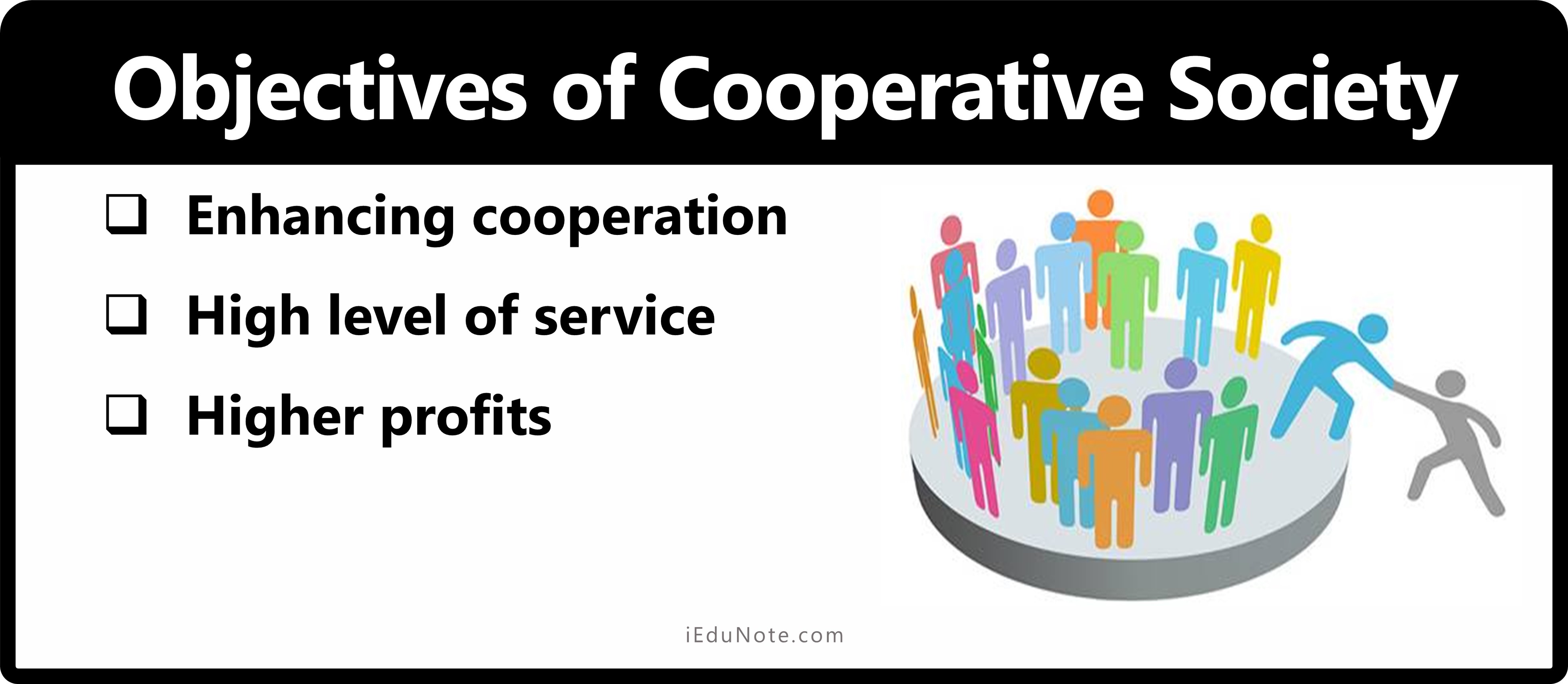
Cooperative societies and organizations have several main objectives. Such organizations are considered to be jointly controlled by those working at the organization and those receiving services from the organization. So, in essence, there are high levels of cooperation between these two parties of people.
Cooperative societies originally came about to unite business owners with their staff members. They led to the practice of private companies being ‘split’ into shares, which were given to employees at various levels of the company.
Essentially giving each individual within a firm a small piece of it raised productivity, as people gained the sense that they were very much part of the organization, rather than just somebody working for it.
The following points describe some of the main objectives a cooperative society has.
Enhancing cooperation
Cooperative societies aim to encourage complete cooperation between everybody involved with an organization. They are generally against the idea of any sort of hierarchy, and consider everyone to be equal.
This can improve relationships between staff members and senior management, as well as between service providers and customers.
High level of service
Better working relationships naturally lead to higher productivity levels, so a better service is given to customers. This raises customer satisfaction levels, which is the primary aim of many cooperative societies.
For instance, student accommodation units may be cooperative societies. Students will be happier with their accommodation and the staff remembers will find their working life much easier.
Higher profits
Many cooperative societies are essentially out to make a profit and believe that enhancing relationships will lead to high-profit levels. Of course, this plan may not always work, but in many cases, it has proved effective.
Some charities have also benefited from operating as a cooperative society, as charity members become more focused on their work, raising more money for the cause in question.
Role of Cooperative Society
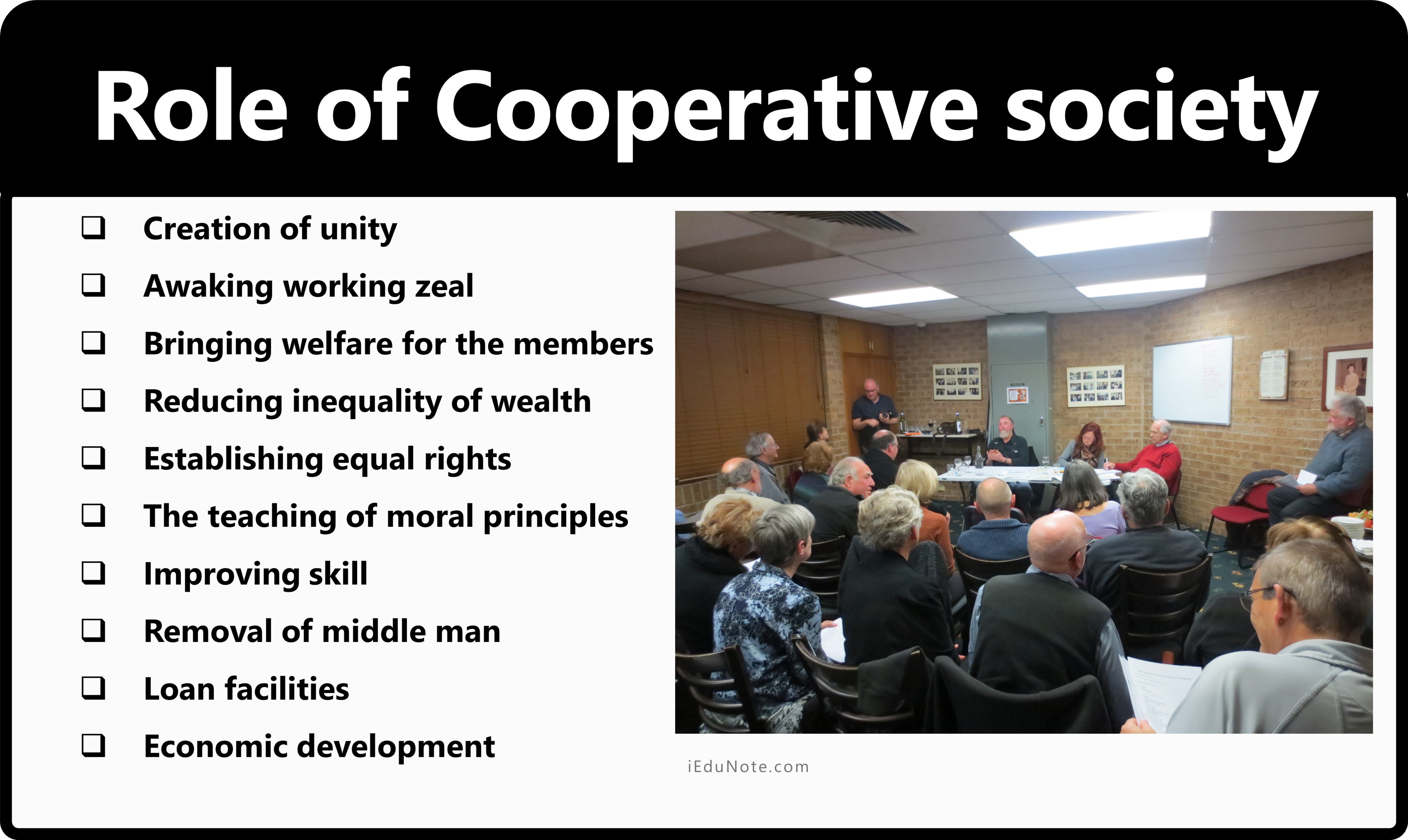
Creation of unity
“Unity is strength” is the guiding principle of a cooperative society. In this purpose cooperative united the weaker and guide them to go ahead with mutual cooperation which helps to endure social relationship.,
Awaking working zeal
Co-operate society helps to awake a new working spirit in the mind of those people who are defeated and spiritless in the struggle of life.
Cooperative society encourages people to dream a new dream and work with new inspiration.
Bringing welfare for the members
A cooperative society is established just for bringing the economic and social welfare for its members. In this purpose, cooperative society develops thinking working attitude as well as the mental condition of the constituents.
Besides by self retirement opportunity and giving dividends. It ensures economic development.
Reducing inequality of wealth
Capitalism creates inequality of wealth, and cooperative society helps to reduce this as well as helps the equal distribution of wealth.
It creates self-employment opportunities and encourages the members to compete with others.
Establishing equal rights
To establish equal rights, cooperative society fixed the limitation of purchasing shares. Besides this, democracy and equal voting rights are also followed. Equal right contributes to establishing social order and justice.
The teaching of moral principles
Cooperative society plays an important role in mental improvement by teaching moral principles like unity, trust, honesty, order, cooperation, which ensure social order.
Improving skill
Cooperative society leads a great role by providing a training program for improving the skill of uneducated poor and unskilled members.
Removal of middle man
The cooperative society helps to protect the lower and middle-class people of the society who have fixed income, from the greedy clutch of profiteering, capitalist, and the middle man.
This society produces or collects goods from the manufacturer and supplies these goods to the members at a cheap rate. In this way, it achieves its objectives.
Loan facilities
Poor producers suffer from capital problems. Cooperative credit society, multipurpose cooperative society lend money to these people at a very low-interest rate.
Economic development
By developing agricultural and irrigation systems and to give loans and counseling for small industries and cottage. It also helps to remove poverty and ensure economic development of the country.
Merits or Advantages of Cooperative Society
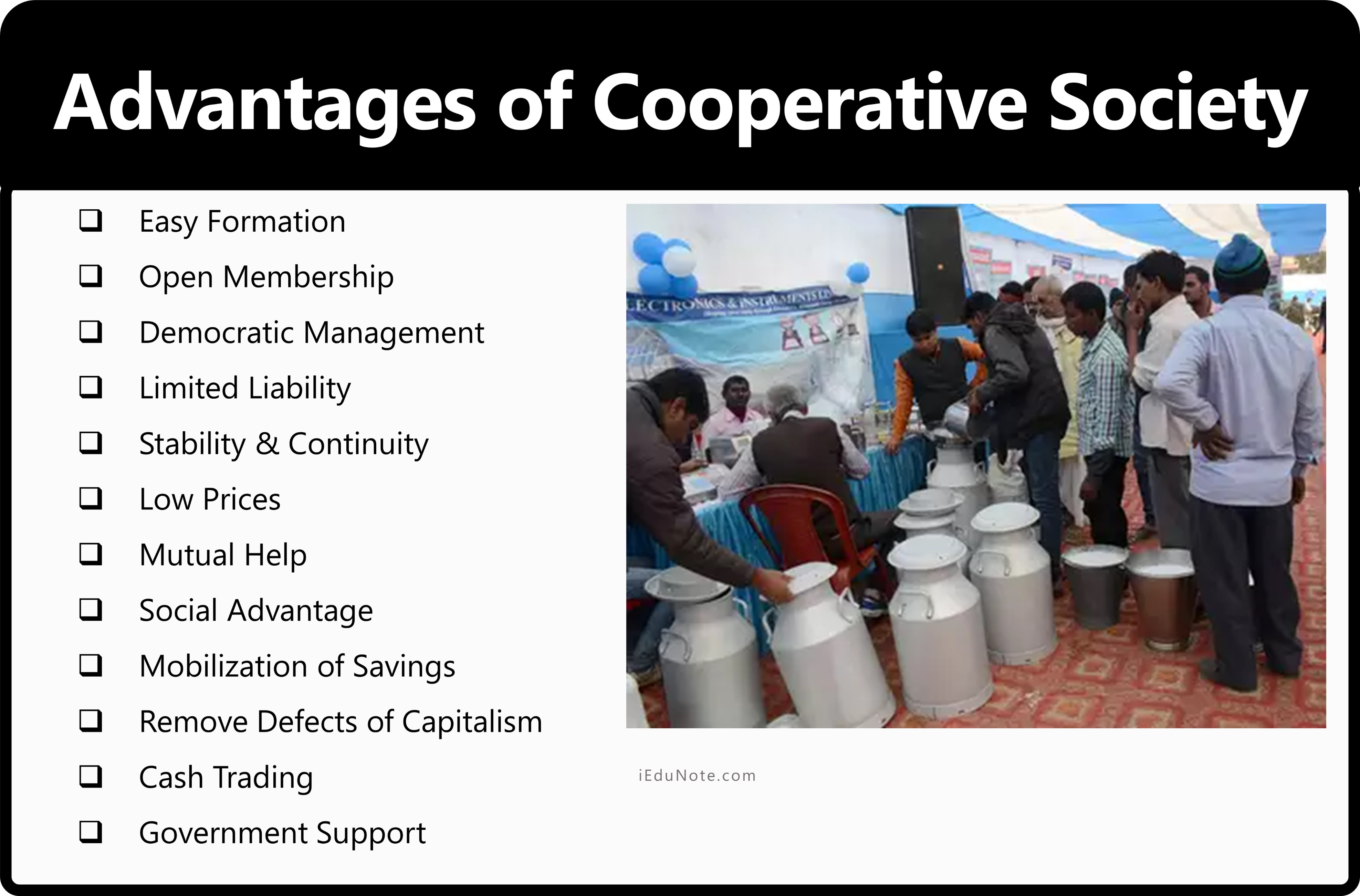
Following are the important advantages or merits of cooperative societies;
Easy Formation
It is very easy to form a cooperative society as compared to a joint-stock company. The simple requirement is ten or more members have to make written application to the Registrar with four copies of Bye-laws.
Open Membership
Cooperative societies work on the principle of open membership; therefore, many persons can become members. The membership is not restricted to a few persons only.
Democratic Management
All the members of the society are jointly known as the general body, whereas the members who manage the cooperative society are jointly known as the managing committee.
They democratically manage a cooperative society. “One member one vote” is the rule, and thus members can have a voice in management.
Limited Liability
The liability of members remains limited to the extent of capital contributed by them. He is not personally liable to pay the liability of a cooperative society. Generally, his liability is limited up to the face value of shares.
Stability & Continuity
The cooperative society has perpetual succession because it is not affected due to death, insolvency, or lunacy of any member. As it is a voluntary association the old members may go, new members may come, but the life of society is not affected.
Low Prices
A cooperative society can make goods and services available at reasonable cost as the profit margin of the society is very less other reason for a low price at a cooperative society is that it eliminates the middleman from a chain of distribution i.e., goods are directly purchased from the manufacturers or producers and sold to the customers.
Mutual Help
The basic aim of the cooperative society is mutual help. Some of the members realizing this principle may offer their services on an honorary basis; this brings a reduction in management expenses.
Social Advantage
A cooperative society discourages monopoly, brings a better distribution of wealth, works on the principle of service, and controls exploitation.
It also uses its surplus profit for social advantages by way of establishing charitable hospitals, schools, etc. So it increases social welfare.
Mobilization of Savings
A cooperative society is a thrift institution. It provides an effective means of pooling together the resources of the weaker sections of the society.
By checking extravagance, it inculcates the habit of savings among the people. Such mobilized financial resources are used for constructive purposes.
Remove Defects of Capitalism
This form of organization removes certain basic defects of capitalism.
For example, monopoly, the undue concentration of wealth in a few hands, profiteering, black-marketing, exploitation of workers and consumers, etc.
These glaring defects of capitalism have no place under a cooperative organization. Through the process of integration, it removes middlemen.
Cash Trading
The cooperative society follows the principles of “cash and carry”.
As a result of this, there are no bad debts, and they can enjoy the benefit of various discounts and concessions. This also inculcates the habit of saving among the members.
Government Support
A cooperative society is the people’s movement. Moreover, it promotes moral, social, and educational values. It also helps the economic enlistment of the people.
That is why the government gives many concessions and privileges to this organization.
Causes of failure of Cooperative Society

Following are the demerits of cooperative societies:
Limitation of Capital
In a cooperative society, there is a limitation on capital because the membership of the society is indirectly limited only up to local people. The members also generally belong to the poor class.
State Control
A cooperative society is governed by the provisions of the Cooperative Society Act or Law.
The compulsion of maintaining records, submission of audited returns, and inspections by the government are the ways through which the state exercises control over societies.
Inefficient Management
The management of a cooperative society is inefficient because the working members of the managing committee may not show a keen interest in the working of society.
The members also lack the managerial skill and intelligence because they generally belong to the lower class.
Absence of Business Secrecy
The officers of cooperative societies are generally so much exposed to the members that it becomes difficult for them to maintain proper secrecy, and it is compulsory to advertise the annual account and annual reports in newspapers.
Lack of Motivation
There is a lack of motivation for the managing committee and other staff members because there is no relation between efforts and rewards. The rate of dividends is also restricted to 15%; this discourages the public from joining a cooperative society.
Political Interference
The cooperative society acts as a platform for political activities at the time of the election of the managing committee, some of the political parties get involved in it due to which the basic principle of the cooperation comes to an end.
This also leads to the corruption of power and money in society and may result in quarrels and disputes amongst the members.
Limited Scope
Like capitalism, the cooperative system cannot be extended to embrace the whole economic system.
It has limited scope in the sense that it cannot cover the entire economic system. The principles of cooperation cannot be successfully applied to organize all types of economic activities.
For example, a cooperative society is not suitable for organizing big industrial enterprises. It is also not suitable where the element of speculation plays a predominant role and where finer varieties with maximum skill are to be produced.
Internal Quarrel and Rivalries
Internal quarrels and rivalries among members is another limitation of cooperative organization.
As a result of these internal quarrels, rivalries, and tensions, general body members cease to take any interest in the working of the organization. All this ultimately brings the cooperative society to ruin.
Lack of Public Confidence
Generally, people do not have faith and confidence in the cooperative society. Since many cooperatives have failed, the people are reluctant to become members of cooperative organizations.
The general apathy and indifference of people come in the way of development of a cooperative organization.
Absence of Economics of Scale
This organization is very small in size. It does not have financial, managerial, and technical resources. As a result of this, the advantages of large-scale operations like Joint Stock Company are not available to this organization.
Restriction of Number
As per the prevailing legislation, cooperative society cannot be formed unless and until a minimum of 10 adult members is available. As a result of this, its growth is checked because less than 10 members cannot form a society.
Types of Cooperative Societies
Cooperative societies may be classified into different categories based on the objectives, purposes, and nature of activities performed by them.
When some cooperative units are formed for the achievement of specific economic objectives, others are formed either with the purpose of social upliftment of the members or to help consumers, small farmers, or small producers.
Based on that the main types of a cooperative society are;
- Consumers’ Cooperatives.
- Credit Cooperatives.
- Cooperative Farming Societies.
- Cooperative Better Farming Societies.
- Cooperative Joint Farming Societies.
- Tenant & Joint Farming Societies.
- Collective Farming Societies.
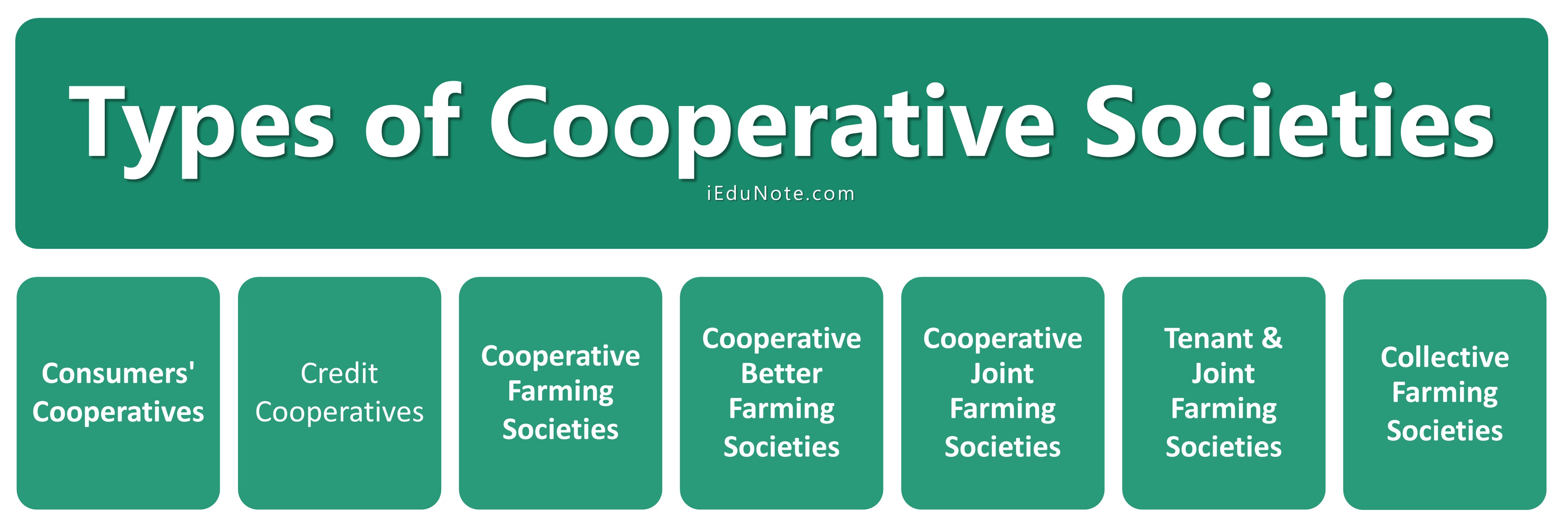
Consumers’ Cooperatives
These societies are formed by the members to provide goods and services at a cheaper rate by eliminating middlemen’s commission by establishing a direct relationship with the manufacturers or wholesalers.
They purchase bulk goods and services directly from the manufacturers or wholesalers and sell those among the members in the small stalls.
The profit which usually wholesalers or their dream of having an own house fulfilled.
These societies engaged in acquiring the land from genera public, develop them, construct houses as per the choice of the members and then transfer the said houses in favor of the members.
In consideration that members pay the due price for the house may be on an easy installment basis spread over as long years.
Cooperative societies, at times, arrange finance/loans for the members from different financial institutions to bear the cost of the house.
Some societies also sell plots to their members for the construction of houses at their level.
Credit Cooperatives
Credit cooperative societies are formed for providing finance to the poor farmer and needy members of the society at a lower rate of interest.
The society collects funds from its members in the form of share capital as well as accepts deposits from the general public. It also avails loans from state cooperative banks.
The fund so collected are used in providing loans to the needy people, generally to the members as loans and advances on easy terms and conditions.
This process of financing people saves them from exploitation by the money lenders who usually charge a high rate of interest and stiff terms and conditions.
Credit cooperative societies are two types: agriculture credit cooperatives and non-agriculture credit cooperatives. An agricultural credit cooperative society extends credit to the rural people both for productive and non-productive purposes.
A non-agricultural society is meant for urban masses and meets its short-term financial requirement.
Cooperative Farming Societies
To achieve a higher rate of return from economies of scale, small farmers and marginal farmers of a particular area may join their hands, form a cooperative society, and go for mass farming instead of individual farming.
They contribute capital, land, and labor and jointly go for any farm activity. This becomes beneficial to the members in many ways like;
- mass production,
- maximum output,
- application of advanced technologies, fertilizers, and manuals,
- pooled resources, land, labor, and others,
- proper irrigation,
- no shortage of capital to meet day-to-day expenses, etc.
Cooperative Better Farming Societies
These societies are started to improve the methods of fanning among the members. They arrange the machinery, seeds, fertilizers for the farmers. Farmers get higher output by utilizing the same.
The members, in turn, pay some charges for this service rendered by society. Thus, both the members, as well as the societies, are benefited by that.
Cooperative Joint Farming Societies
In this type of society, the land of the individual members is taken by society, but the ownership remains at the members. The members are allowed to spare their labor in consideration of wages for doing work on the land.
The outputs are sold by the society, and any profits realized are distributed among the members in the ratio of their land values.
Tenant & Joint Farming Societies
This type of farming society takes the land on a leasehold or freehold basis. The land is distributed among the nri6i*ribers, and they cultivate those lands and grow agricultural products.
The members pay the rent for the utilization of the land. Landless laborers having manpower strength are more benefited by this type of society.
In joint farming, ownership lies with society. Whatever products are produced belongs to society.
But in tenant farming, society members enjoy the output produced in the land owned by others and only pay a certain amount of charges for cultivating the land of others.
Collective Farming Societies
The land is owned by the society. Members work collectively on the land.
The members are paid with the wages. Surplus of the society, if any, are distributed among the members in the ratio of their wages.
It is different from joint farming society in terms of ownership of land.
Differences between Cooperatives and Company
| Topics | Company | Cooperatives |
|---|---|---|
| Formation | The formation of a company is more formal and complex. | But it is easy to form the Cooperatives Society, although it is a law created organization. |
| Purpose | The main purpose of the company to ensure the profit of shareholders. | Its main purpose in improving the financial condition of members, not to earn a profit. |
| Number of members | The number of members in private company minimum two and maximum fifty, in public company minimum seven and maximum limited with many shares. | In a cooperative society, the minimum is twenty, and the maximum is unlimited. |
| Transfer of share | The share of a public limited company is openly negotiable, but not in case of a private company | The share of a cooperative society can be negotiable to take permission from the authority. |
| Allotment of dividend | A dividend is given from reserve funds or earned profit. This decision is taken in a directors’ meeting. | In the case of society, a small portion of the earned profit is to be given as dividends. |
| Management | The directors who are elected by shareholders and appointed managers operate the company. | Elected directors operate the society, but they do not get any salary. |
| The relation between owner and directors. | In a joint-stock company, there is a great divorce between owner and control and often a clash of interest. | But the co-operate enterprise makes for the oneness of interest. |
| Interested in welfare | The joint-stock company is not directly interested in the promotion of the welfare or efficiency of its shareholders. | But in the case of cooperative, it is a part of their creed to take such interesting to their members. |
| investment capacity | In a company, the amount of investment determines the number of votes. | In the case of cooperatives, each member has only one vote regardless of his investment in the enterprise. |
| Area of operation | This is not possible in a company as shareholders are scattered all over the country; only the inner group can control the affairs of the company. | A cooperative society operates within a limited area, and so all the members can attend its meetings and exercise their control. |
Factors responsible for the survival of cooperative organizations
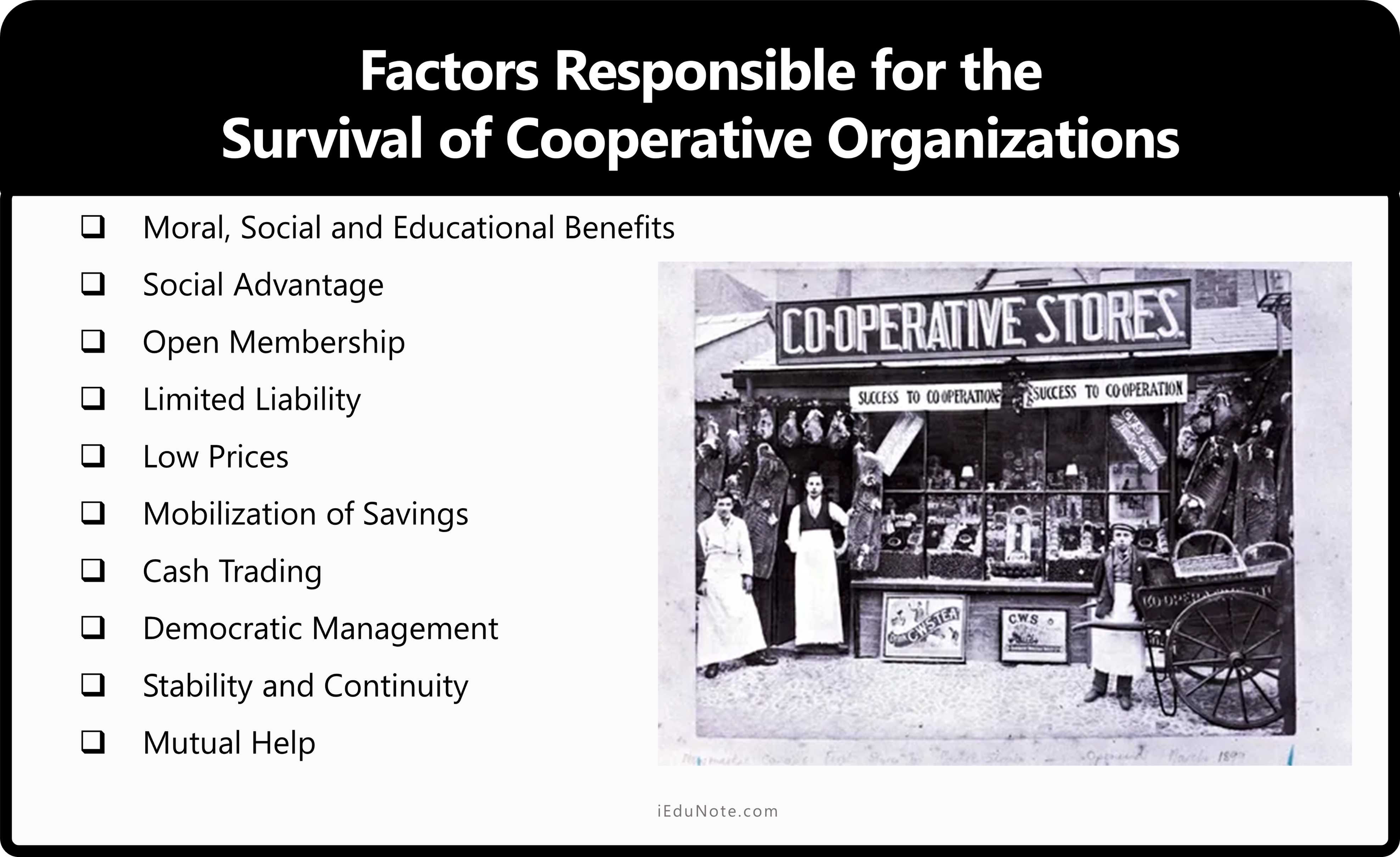
Moral, Social and Educational Benefits
Truly speaking, cooperation is a great moral movement. Its motto is “each for all and all for each,” which emphasizes the moral basis of the movement.
The movement is essentially moral and keeps in view the moral rather than the material sanction. It also promotes a sense of cooperation and brotherhood among the people of the locality.
In addition to these economic, social, and moral benefits, it is also capable of educating the masses in citizenship and political life.
Social Advantage
Cooperative organizations discourage monopoly, bring a better distribution of wealth, works on the principle of service, and controls exploitation.
It also uses its surplus profit for social advantages by way of establishing charitable hospitals, schools, etc. So it increases social welfare.
Open Membership
Cooperative organizations work on the principle of open membership; therefore, many persons can become members. The membership is not restricted to a few persons only.
Limited Liability
The liability of members remains limited to the extent of capital contributed by them. He is not personally liable to pay the liability of a cooperative society. Generally, his liability is limited up to the face value of shares.
Low Prices
Cooperative organizations can make goods and services available at a reasonable cost as the profit margin of the society is very less.
Another reason for a low price at a cooperative society is that it eliminates the middleman from a chain of distribution i.e., goods are directly purchased from the manufacturers or producers and sold to the customers.
Mobilization of Savings
As pointed out earlier, basically, a cooperative society is a thrift institution. It provides an effective means of pooling together the resources of the weaker sections of the society.
By checking extravagance, it inculcates the habit of savings among the people. Such mobilized financial resources reused for constructive purposes.
Cash Trading
The cooperative organizations follow the principles of “cash and carry”.
As a result of this, there are no bad debts, and they can enjoy the benefit of various discounts and concessions. This also inculcates the habit of saving among these members.
Democratic Management
All the members of the society are jointly known as the general body, whereas, the members who manage the cooperative organizations are jointly known as the managing committee. They democratically manage a cooperative society.
Stability and Continuity
The cooperative organizations have perpetual succession because it is not affected due to the death or insolvency of members. As it is a voluntary association the old members may go, new members may come, but the life of society is not affected.
Mutual Help
The basic aim of the cooperative society is mutual help. Some of the members realizing this principle may offer their services on an honorary basis. This brings a reduction in management expenses.
Problems of Cooperative Society
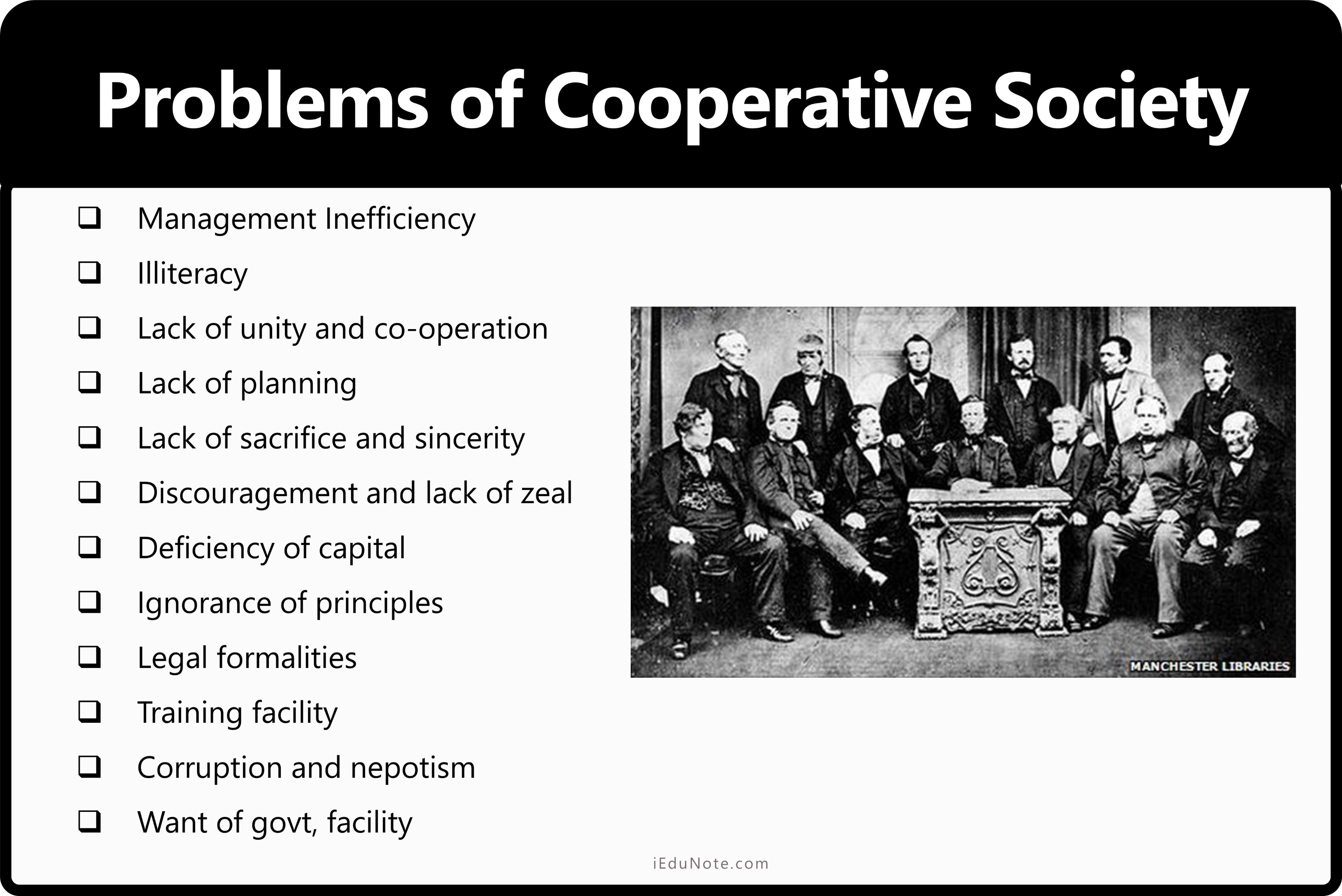
The cooperative societies are operating under several hurdles. Those hurdles create some problems as follows:-
Management Inefficiency
Cooperative Society, a mutual organization. So an efficient manager is badly needed to manage such an organization.But in some 3rd world countries, appointed managers are almost inefficient. So the success is impeded.
Illiteracy
Most people in Bangladesh are illiterate. So they aren’t conscious of right or wrong. The constituents can’t show their required responsibility as they are inexperienced.
Lack of unity and cooperation
Unity is strength, and each for all, all for each, is the guiding principle of cooperative society. But there is a lack of unity and cooperation in poor people in Bangladesh.
Lack of planning
Planning is the base of success. But proper planning isn’t followed In bang in case of cooperative society.
Lack of sacrifice and sincerity
The success of a cooperative society depends on the sincerity and sacrificing mentality of Its people. Managing a cooperative society without serving modality is Impossible.
But we have a lack of sincere and sacrificing mentality of people.
Discouragement and lack of zeal
For achieving the desired goal, the eagerness of the entrepreneur is very much important. It is equally true to a cooperative society.
Deficiency of capital
Our cooperative is usually seen in low or middle classes. For that reason, sufficient capital can’t be supplied. As a result, the org can’t take many benefits.
Ignorance of principles
Our cooperative hasn’t possessed the mentality to obey the principles of this organization. But success depends on these principles. I so in this country, the development of a cooperative society is slow.
Legal formalities
Cooperative society Act may sometimes obstacles the development of this organization in this country.
Training facility
Most of the managers and constituents of cooperative society are inefficient. The training facility is indiscernible for better results. But this facility is rare in this country.
Corruption and nepotism
Corruption and nepotism are common in every part of our life. The authority tends to cheat the uneducated members. Besides, nepotism in giving loans and employment hinds development.
Want of govt, facility
The government facility is essential for the development of any organization. India lacks this facility govt; the law sometimes hinders the development.
Solutions for Problems of Cooperative Society
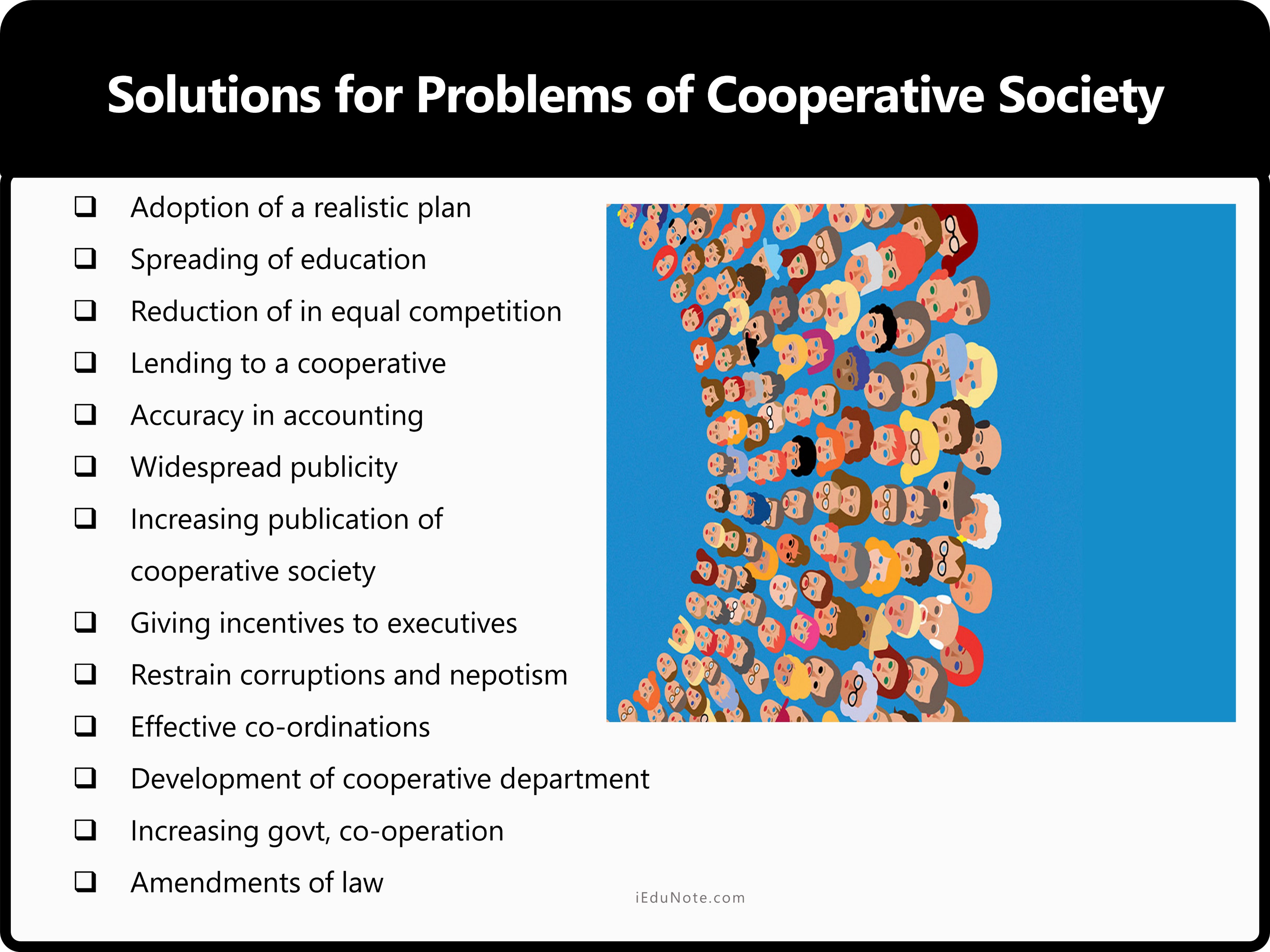
The problems of cooperative may be solved in the following ways:
Spreading of education
A realistic plan should be adopted immediately for a cooperative society. This plan should be adopted based on the socio-cultural environment of this country.
Spreading of education
For the development of a cooperative society, a great number of people must be acquainted with the curse of illiteracy. Besides, they have to be studied in cooperative education.
So, they can realize the importance of a cooperative society. Only then can they contribute spontaneously to the betterment of the organization.
Reduction of in equal competition
A cooperative society is a small organization. But in the market, it has to compete with big organizations. So for the betterment of a cooperative society, equal competition should be eliminated.
Lending to a cooperative
Due to poverty, our cooperative societies can’t be expanded. The govt should lend easy term credit so that cooperative society can contribute to the economic development of the country.
Accuracy in accounting
The old policy must be changed into modem and accurate accounting policy. So forgery will be removed.
Widespread publicity
People should be informed about cooperative society through national media. They have to be informed about the problems and solutions to the problem of cooperative society.
Increasing publication of the cooperative society
It is very much important to increase the publication on cooperative society to give more information to the corporate and the general public.
Giving incentives to executives
The success of a cooperative society largely depends on the satisfaction of the executives. But they don’t work without any interest.
If we motivate them positively by giving incentives, they must devote themselves to the org.
Restrain corruptions and nepotism
It is very much important to remove corruption and nepotism from that org. For this standard, management should be implied. Besides, high-level executives and govt should be more expert.
In appointing employees and sanctioning a loan, a decision is to be made regarding their experience.
Effective coordinations
A cooperative society is influenced by government law. So the govt, the law should be in favor of a cooperative society.
Besides this, primary, central, and national cooperative societies must develop good coordination. It is also important to co-ordinate the cooperative related ministry, other departments, and the working people.
Development of cooperative department
Cooperative departments are the leader of cooperative movements. But bureaucracy is common in cooperative departments. So it should be removed immediately.
Increasing govt, cooperation
In comparison with other organizations, cooperative society is allotted a small amount of money. So it is important to increase govt, cooperation in monetary and nonmonetary units.
If the govt, patronizes the promoters with granting more capital and information, people will encourage in forming this org.
Amendments of law
To overcome the hindrance of cooperative society, there must be needed amendments of law and remarks on the law with easy description.